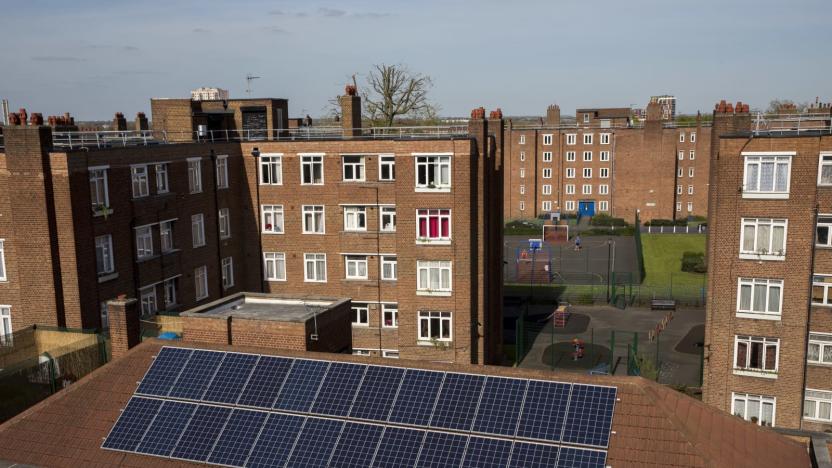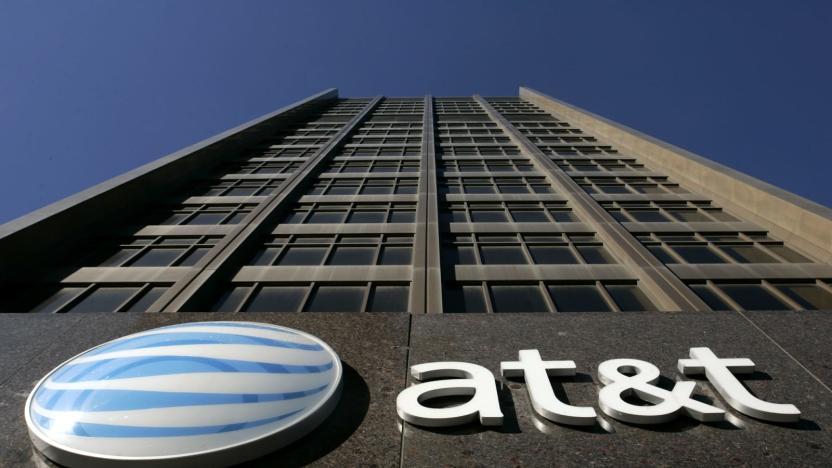LowIncome
Latest

T-Mobile is giving you 36 months to pay off select phones
T-Mobile is giving people more time to pay off their phones. On Friday, the mobile carrier will launch a new 36-month installment plan that will stretch the cost of a smartphone out over the course of three years rather than the standard two-year period. Only a handful of phones will be available for the plan at first -- and it's not clear yet how good of a deal this might be, as well.

800,000 low-income UK homes to benefit from free solar panels
One of the biggest ever green energy schemes in the UK is set to provide clean energy for as many as 800,000 low-income homes over the next five years, renewable energy provider Solarplicity has revealed. As part of a £160 million investment from Netherlands-based Maas Capital (part of the ABN AMRO Bank), the company will provide 100,000 households with free solar panels over the next 18 months and hopes to reach its target within five years.

AT&T uses loophole to deny low-income internet discounts
AT&T is using a technicality to refuse its FCC-mandated "Access From AT&T" discount program to low-income families that should qualify for it, according to the National Digital Inclusion Alliance (NDIA). In an absurd twist, the loophole is that its broadband speeds in the affected areas are too slow.

Feds to overhaul program that delivers broadband to the poor
While 95 percent of American households earning six figures annually have access to broadband internet, just 48 percent of homes making under $25,000 enjoy the same benefit. Thursday, the Federal Communications Commission announced plans to reduce that internet inequality gap by subsidizing the broadband access for America's poorest families. Specifically, the FCC is looking to revamp its existing Lifeline program, which already provides both phone and prepaid wireless service, to now include broadband as well.

Comcast's internet access program for low-income families will continue indefinitely
Comcast's Internet Essentials program was originally supposed to wind down this June, roughly three years after its launch in the wake of the NBC merger. However, the company has had a lot of success with the initiative -- enough so that it's extending the program indefinitely. Low-income American families can continue to sign up for basic, $10 per month internet access as long as they have children who qualify for free lunches. Comcast is also providing an extra level of coverage by funding 15 Internet Essentials Learning Zones, or partner networks that will help kids stay online at school, libraries and after-school activities. These latest moves won't completely bridge the gap between internet haves and have-nots, but they should be valuable complements to expanded school broadband efforts.

India's prime minister reportedly working on giving free handsets to low-income families
We've seen companies like Microsoft help out low-income people by dropping prices on its hardware and software in the past, and now India's prime minister's allegedly taking a similar approach but with mobile handsets being the focus behind this nice gesture -- and better yet, at no cost whatsoever. Per the Times of India, sources have told the publication Manmohan Singh's got a plan in the works that'd bring one mobile device to "every family living below the poverty line," with said "Har Hath Mein Phone" scheme expected to be announced as early as next week. Notably, if all goes according to the purported plan, this would help over 6 million Indian families, most of which are currently lacking any sort of communication device in their household. There's still a few days until we find out whether the project is indeed real, for now let's just hope our friends in India don't experience some more power outages anytime soon.

Comcast's Internet Essentials program expanding as digital literacy project soars
If everyone needs the internet, then poor kids need it more -- since so much learning material is dependent on technology. Comcast teamed up with the FCC to produce Internet Essentials: a $10 a month broadband plan and $150 computers to get the nation's poorest families online. Six months later, the program's been a colossal success, leading to the company adding some sweeteners: eligibility is being relaxed to include any family who qualifies for discounted lunches (swelling the catchment group by a further 300,000). It's also doubling the speed of the available connection: 3 Mbps down and 768 Kbps up and is allowing community groups to bulk-buy packages to directly supply the most impecunious households. It's also pairing up with the "connect to compete" initiative to reduce computer costs, enrich digital literacy materials and connect those outside of Comcast's core service areas. You can head on down to our source link to read the extended report and see how families are benefiting from a little corporate good deed.

FCC revamps Lifeline phone service, cuts the fat from carriers' bottomlines
With a site redesign freshly under its belt, the FCC's setting its recently honed eye for modernization on other, more pertinent areas of its jurisdiction -- like Lifeline. The universal program, a means of guaranteeing affordable phone service to low-income families, hadn't exactly kept pace with changes in the telecom industry, overlooking consumers' preference for wireless and the growing need for pervasive broadband access. That's all set to change with new measures adopted by the Commission today designed to curb carrier abuse of the antiquated system and automate the enrollment process by eliminating unnecessary duplicate accounts and subsidies. A pilot program to offer and potentially bundle discounted, high-speed internet to eligible participants is also underway, with potential ISP partners currently being solicited for inclusion. All told, the moves could wind up saving the federal agency over $2 billion in misdirected funds over a three-year span, leaving more money on the table to help your average Joe and Jane America step firmly into the 21st century.

FCC enlists more cable providers to offer discounted broadband to low-income families
Back in September, Comcast teamed up with the FCC to offer discounted broadband access to low-income families, in the hopes of bridging the connectivity gulf separating the haves from the have-nots. Today, that campaign is gaining new momentum, now that Time Warner Cable, Cox and most other major US cable providers have thrown their hats into the ring. According to the New York Times, many of the industry's heaviest hitters have agreed to offer high-speed access for just $9.99 per month, fueling the FCC's efforts to reach the estimated 100 million Americans without an at-home internet connection. The low-cost service will be made available for a 2-year period to disconnected families who have at least one child enrolled in the national school lunch program, and who have not recently subscribed to a broadband provider. On top of that, Ohio-based IT firm Redemtech will provide discounted computers to these families at a price of $150, with Morgan Stanley offering microcredit to those who need a little extra time to make the payment. FCC Chairman Julius Genachowski says the initiative, slated to be announced later today, should make a "real dent in the broadband adoption gap," by making the internet more accessible and, in theory, more valuable. The Commission hopes to expand the program to the entire country by September 2012, now that it's enlisted most cable heavyweights. Notably missing from the initiative are Verizon and AT&T (which has its own FCC-related matters to worry about), though the reasons for their absence remain unclear.

Microsoft to offer discounted hardware, software to students from low-income families
You don't need a PhD in economics to realize that times are pretty tough right now -- especially for those at the lower end of the income ladder. Fortunately, though, Microsoft has announced a new initiative aimed at providing one million students from low-income families with discounted hardware, software and broadband service. This three-year digital inclusion program is an extension of Redmond's Shape the Future campaign, which, over the course of five years, has already put computers in the hands of more than 10 million underprivileged children around the globe. Under this public-private partnership, Microsoft will work with a variety of nonprofit, corporate and governmental organizations to provide low-cost PCs, educational software, job skills training and high-speed internet to those who need it most. The ultimate goal, of course, is to bridge the achievement gap dividing students with at-home internet from their less digitally-equipped peers. According to the Federal Reserve, children who don't have online access at home graduate high school at a rate that's six to eight percentage points lower than those who do. Inflating national poverty rates and widening income gaps probably won't do much to remedy that discrepancy, but we're certainly hoping that Microsoft can make a difference. Find out more in the full PR after the break, or at the source link below.








